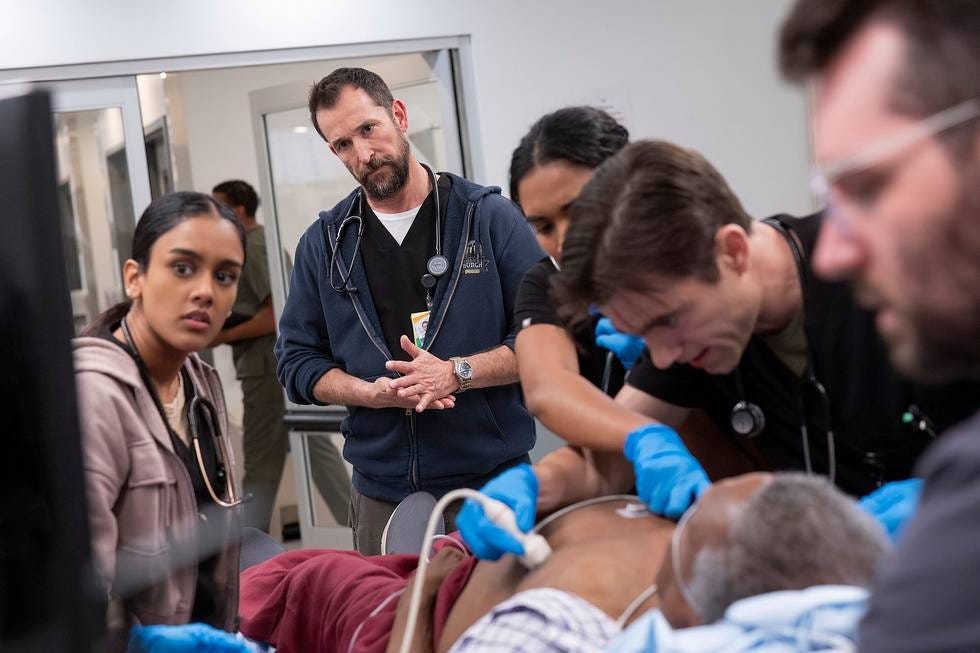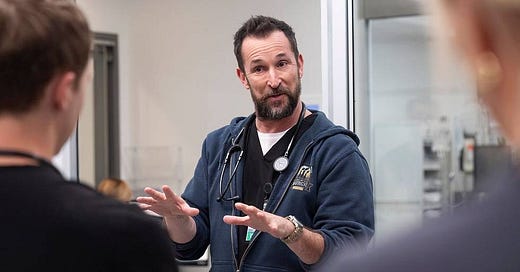'The Pitt' proves prestige TV doesn't have to be elaborate
On two things I especially admire about the show's resuscitation of network TV tropes
"The Pitt" is doing something rare on television right now: resuscitating the tried-and-true network medical procedural and reinventing it for the streaming era.
Airing Thursdays on Max, the series follows the familiar beats of network TV, drawing from the several "ER" veterans behind the show, including star Noah Wyle. But there’s a freshness and vitality that elevates "The Pitt" from what could have been formulaic and melodramatic. A lot of that dynamism has to do with the show's documentary-like focus on the present: The whole season chronicles a day in the life of Wyle's character, Dr. Robby, and each of its 15 episodes depicts one hour of his shift at the helm of an understaffed ER.
On "The Pitt," time only moves forward, other than in some occasional flashbacks, a few seconds long, of Robby watching his mentor die at the height of the pandemic. (I'd argue the show could even do without those flashbacks at all, but that's a minor quibble.) The show's relatively straightforward approach to time stands out in the prestige TV era, when sometimes, the more elaborately a show is structured, the more it gets held up as innovative. But not every show needs to be built around constant time jumps, flashbacks, or multiple timelines in order to be great. Sometimes, keeping it simple is precisely what makes the show work.
I banged my drum about this two years ago, in a piece tied to a certain seismic episode during the final season of HBO’s "Succession," with a breathtaking, 27-minute-long real-time sequence as its centerpiece. (I'm being evasive in the event anyone has not seen this episode. But also, it aired two years ago, so aren't we well over the spoiler statute of limitations?) Yes, a very different show, but it exercises a similar restraint in its use of a single timeline.
Keep it simple, keep it moving. I say "simple," but that's not to diminish the artistry and craft that goes into creating that laser-like focus on the present — see the intricate camera setup the "Succession" crew devised to shoot that aforementioned real-time sequence.
By focusing entirely on one present-day timeline, there's an economy in the storytelling. No need for an overly showy flashback sequence to tell us something about a character’s past, when we can learn about who these people are through a quick reaction shot or an incidental line of dialogue in the present. On "The Pitt," the camera moves frenetically to capture the different storylines happening simultaneously. But other times, it slows down and stays with a particular set of characters, and we watch them connect and bond.

The show's focus on the present allows for rich character development. I especially love that virtually all of the central relationships on "The Pitt" are mentorships, and mentoring is a major thread that runs through the series. The pilot episode immediately establishes this theme: It's the anniversary of Robby's mentor's death, the same day he must now guide a crop of new interns and medical students through their first day in the ER.
While the show revolves around Robby, pretty much every major character becomes a mentor, mentee, or both, whether formally or informally. Robby mentored all of the more senior doctors, who are now mentoring the newcomers. In addition, indefatigable charge nurse Dana, who effectively serves as the air traffic controller of the ER, is kind of a mentor to everyone (and honestly, I'd watch a version of "The Pitt" built around her instead of Robby — a fascinating perspective shift). We learn so much about the characters through watching how they train and counsel each other. It goes back to that economy of storytelling: The small details in the writing and acting choices speak volumes and do a hell of a lot to push the story forward.
I have a particular fondness for seeing mentorships on screen because I think they're an underappreciated category of relationship. Last summer, fed up with the inane "discourse" around FX's "The Bear" and whether Carmy and Sydney should be in a romantic relationship, I argued that the real heart of the series is how, similar to "The Pitt," nearly every character becomes a mentor figure to another character. There's a richness to each one of those relationships because they're built on mutual appreciation and empowering the other person.
I could rattle off a list of other favorite shows with similar mentor-mentee dynamics. Recency bias: Janine and Barbara on "Abbott Elementary." From the past: "30 Rock" will always be a formative sitcom because teenage me saw a lot of myself in Liz Lemon (lol). But the way she finds an unlikely mentor in network suit Jack Donaghy is also one of the show's great joys. (In "30 Rock" fashion, the show periodically pokes fun at this, like when Jack awards Liz the "GE Followship Award." Not coincidentally, many of these examples are workplace shows.)
Last year, I went through a phase of reading several books and articles about friendship and how it gets short shrift in a society that prioritizes relationships by blood or marriage. I think there's a similar book to be written about mentorships, and I've pondered writing one myself (maybe once I sell the one that’s currently in progress).
Many of us have probably been a mentor, mentee, or both. Over the years, I've formally or informally mentored students and early-career journalists, which I find incredibly rewarding. Now that I also teach journalism, I spend a lot of my energy considering whether I'm striking the right balance of being encouraging but honest, authoritative but accessible. In all of this work, I find myself channeling the mentors I've been deeply fortunate to have throughout my career (several of whom read this newsletter, so I'm risking breaking the fourth wall here).
All of this is to say I love the way "The Pitt" acknowledges mentoring as a formative relationship in many people's lives, without being heavy-handed about it. In fact, all of it — to bring this back to the show's structure and straightforward approach to time — is done very matter-of-factly. Restraint can speak loudly and resolutely too.
Thanks for reading. Last week's newsletter seems to have struck a chord with many of you. Special thanks to everyone who reached out with your own stories about wrestling with ambition and/or words of encouragement. It means a lot.
Are you watching "The Pitt"? What has stuck with you about the show? I had a lot of trouble narrowing down what I wanted to write about it, so I kept it to these two main observations (for instance, I considered whether to devote a third section to my thoughts about the show being set in what is effectively my hometown, but that’s a story for another day). Are there other shows that take a similar approach to time, or any other great shows about mentoring? As always, I love hearing from you, so drop me a line however you wish… and don’t forget to keep an extra pair of scrubs around.




